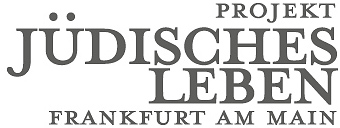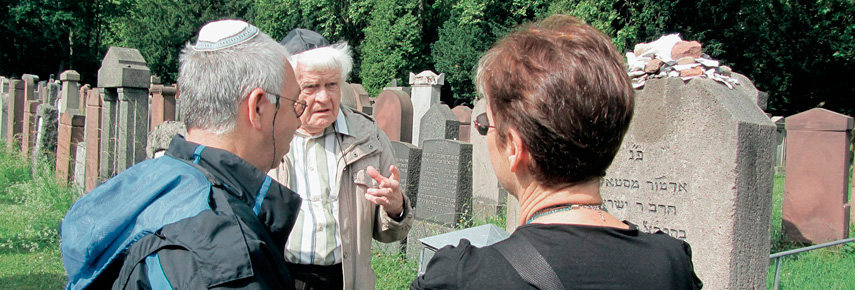Her father, Dr. Selmar Spier, a lawyer, was born in 1893 in Frankfurt and grew up in Gruene Strasse near the zoo.
The paternal side of the family came from Merzhausen/Schrecksbach in Northern Hesse, where they had settled for many generations. Selmar Spier`s father Simon Spier, came to Frankfurt at the end of the 19th century where he opened Schuhhaus Spier with his brothers. The shop was first in Alte Gasse, at the corner of Schaefergasse, and after 1908, in Fahrgasse.
In Frankfurt, Simon Spier married Berta Kaufmann. She was born in Merzig/Saaland and lived with her family in Eschenheimer Anlage 2. When his mother-in-law was arrested by the Gestapo in Berlin in 1933 and jailed for a while, Selmar Spier immediately decided to leave Germany. In 1934 he began preparations to leave for Palestine.
He emigrated in 1935, followed a year later by his wife and the nine-month-old daugther, Miriam, as well as the two grandmothers.
The family settled in Ramkot Hashawim, a village set up by German academics, where the family ran a farm.
Miriam still lives in Ramot with her sons and their families.
After a hard day’s farm work, Miriam’s father, Dr Selmar Spier, took the time to write a book about Frankfurt that was published in 1962: “Vor 1914: Erinnerungen an Frankfurt” (Before 1914: Memories of Frankfurt).
He wanted his children, two of whom had been born in Palestine, to get to know Frankfurt. The publication of the book was made possible by the then mayor of Frankfurt, Dr Walter Leiske.
In six chapters, Selmar Spier describes his family life in the Spier and Kaufmann circles, his sheltered childhood and youth in Gruenen Strasse and later, in Eschenheimer Anlage 2.
He continues with wonderful, almost melancholic descriptions of that old Frankfurt with all its loved and frequently visited areas: the Old Town with its narrow alleys, the zoo, the Palmengarten (botanical gardens), the many cafes, the riverbanks of the Main, the opera, the theatre, the impressive Hauptbahnhof with the spacious Kaiserstrasse leading into the City, as well as the Anlagenring which then had bridle paths and where, as a child, Selmar Spier used to watch the riders.
The former Frankfurter describes his school days at Samson Raphael Hirsch School and later at Goethe Gymnasium. His law studies and his student life are described in a later chapter.
In another chapter Selmar Spier deals with his “Vaterland”: the fatherland for which you were ready to stand for, where you were a conscript, the fatherland you defended, the fatherland for which you went to war and for which you were ready to die.
In his last chapter, Selmar Spier declares that he and his generation “were born as Jews and brought up as Germans”.
“One day it was not my fatherland any more”. Thus ends Selmar Spier`s report about the beloved home town of Frankfurt which he would never have left voluntarily.
Even now, it is a book worth reading. It brings across in a picturesque, lively but also thoughtful manner the background and life of early 20th century Frankfurt.
On the family trail in Merzhausen
Miriam Spier had a strong desire to get to know Merzhausen. And even if her son Boaz, to begin with, did not accept the invitation to visit Frankfurt easily and only took it up at the last minute, he wanted to visit Merzhausen.
Miriam Spier had already been invited to visit by the city of Frankfurt in 2011 but had had to cancel due to an accident. So it was that in 2012 she became part of the group in the first program for the second generation.
As I had been in email and telephone contact with her since 2011, it was not difficult to prepare her trip to Merzhausen.
This turned out to be helpful because the local officials then had enough time to prepare the reception and escort. After a few weeks of preparation, all this worked wonderfully. Mayor Vesker and some older citizens who both could and wanted to remember the Nazi years and the Jewish families in Merzhausen, were there to receive Miriam. We were actively supported by Frau Hoos who has been involved in local history and knows the Jewish history of Merzhausen and Schrecksbach very well.
The local priest and his wife also accompanied us.

